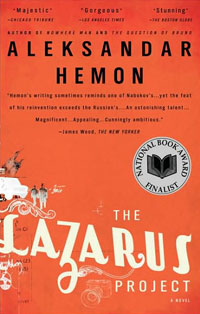This week I had the opportunity to read and see two radically different narratives about the traumas of immigration, and I thought I’d offer each a short review: the movie was District 9 by South African Neil Blomkamp and the novel was The Lazarus Project by Bosnian American Aleksandar Hemon.
District 9 has a great premise – a War of the Worlds story turned right
on its anthropocentric head. No alien invasion story, this movie is all
about starving alien refugees (set in Johannesburg, South Africa, the
shadow of apartheid is almost too obvious here) and the
corporate-controlled human a-holes who oppress and profit off of said aliens. Move over 3rd world, we found a new race to rape, pillage and plunder. Even though they come in a spaceship that looks almost
identical to Roland Emmerich‘s Independence Day (the movie also
included a preview for Emmerich’s sure-to-be-stupid 2012 where a
Tibetan Monk high in the Himalayas awaits an impending world-ending
tidal wave. What’s with Emmerich? Does he need therapy? He seems
incapable of making anything other than cheesy apocalyptic blockbusters
like The Day After Tomorrow), the aliens of District 9 turn out to be
the good guys, and the humans are the villains.
The premise seems highly plausible: if aliens did land on Earth, would
our xenophobic fear-mongering dominate the interaction? After watching
some healthcare town halls and seeing Michelle Malkin top the New York
Times Bestsellers List this week, I’d say it’s more than likely. We are not the
good guys in this one, and that truth feels eerily accurate in the
documentary-style set-up of this film. Unfortunately, the plot
devolves from great premise into an ultra-violent shoot-’em-up over the
last half hour. Maybe the writers just ran out of steam and enrolled in
the all-too-popular when-in-doubt-blow-stuff-up school of
screenwriting, but in the end the mediocre finish of the movie borders
on unintentioned irony. In setting out to make a great commentary on the
violence, fear, and greed of the human race, District 9 actually just
turns into an ultraviolent movie made by (profit-driven) humans. If you
want to give them credit for meta-irony, go ahead. Judging from the great reviews this movie received, the film was given a lot of credit for something I missed. And I’m a fan of sci-fi!
The Lazarus Project, on the other hand, is possibly the best book I’ve
read in 2009. It follows a writer – a Bosnian immigrant to Chicago who
is undoubtedly the author’s avatar – as he gets a grant to research
and write about an Eastern European immigrant to Chicago wrongfully
killed by the Chicago Chief of Police one century earlier, in 1908. The
parallel narratives work together wonderfully. The feelings of fear,
xenophobia, and not having any place in the universe called home are
also brilliantly evoked in this novel. As a writer, I can always tell
when I really like a book – the books I love are the ones that make me
want to write right now, to just get out a pen or typewriter (if
I owned one) and start flowing or banging keys on the spot. Hemon is a
writer’s writer – craft and heart galore. There were a few
moments in Hemon’s novel that I wanted to actually prostrate to his honesty and
communicative prowess. If you are looking for a good novel to finish
out your summer, check this one out.
I find the themes of immigration and homelessness, anchorlessness, to
be deeply Buddhist. In fact, the Tibetan word for Sentient Being could
more literally be translated as “commuter.” We could further that idea
by saying that we sentient beings are “constant immigrants.” I had the
experience this week to encounter two narratives that approach the
sadness and trauma of being an immigrant sentient being from two very
interesting angles.
Let’s have a late-summer roll-call. What are you reading, watching, or
listening to that seems vaguely Buddhist? Or, even better, what are you
checking out this August that isn’t Buddhist at all?


